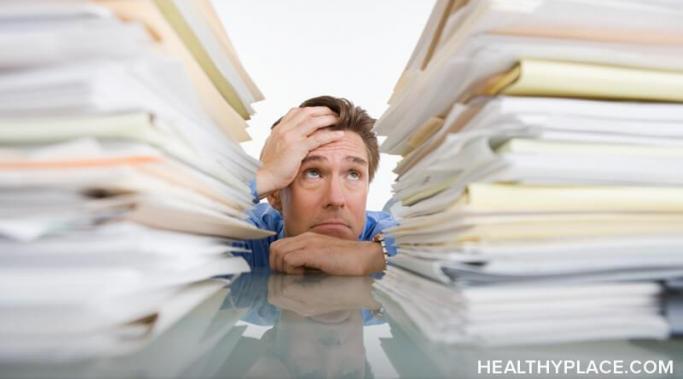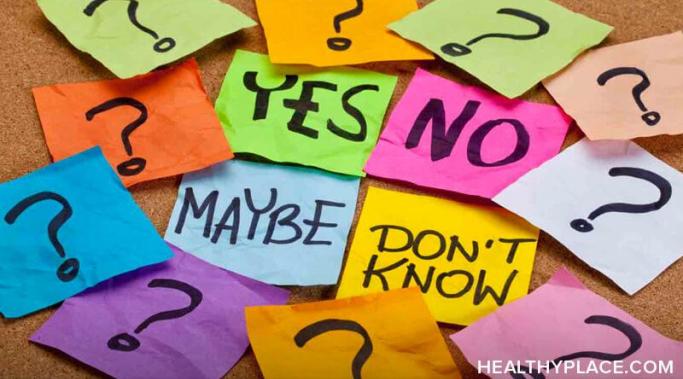Therapy homework differs for each therapist and each client, and many therapists don't do therapy homework at all, which begs the question: does it actually help? I've had several different therapists over the years, and only one or two of them have ever given me therapy homework. Some of my friends in therapy have lots of homework, and I always wondered if my therapists were doing something wrong by not giving me things to do outside of sessions. Now that I've had one or two therapists who do give homework, I think I understand some of the benefits and problems with therapy homework.
Embracing Mental Health Recovery
A common bit of wisdom when it comes to mental illness recovery is that recovery isn't linear. You won't necessarily go from "sick" to "healthy" in a straight line. You will likely have setbacks, backslides, and slip-ups and your journey might look more like "sick," "sicker," "better??" "worse," "functional but still mentally ill." In my experience, this back and forth may continue for years. I can intellectually appreciate that recovery is not a linear process, but emotionally, it often feels like I'm failing.
Therapy is one of the best ways to actively make progress toward recovery from mental illness, but, unfortunately, therapy can be difficult to access when you can't afford it. Even with insurance, sessions can cost upwards of $100. Even if you only go to therapy every other week, that's still $200 per month, which is roughly the same cost as a car payment. Many of us need that money for our actual car payment, and so we end up missing out on therapy we really need.
Are you using old coping mechanisms that no longer serve you? Coping mechanisms are habits and behaviors that we use in order to cope with problems we can't necessarily solve. For instance, if you have to take a big test and it gives you tremendous anxiety, you can't just not take the test or simply stop being anxious. Instead, you need to cope with your anxiety to get through the experience. But what happens when the old coping mechanisms we use actually start causing problems instead of solving them?
The Internet both helped and hurt my mental health. I truly believe the internet has done wonderful things for those with mental illness in our day and age. Before the internet, if you had a relatively rare mental illness, you might have felt completely alone or at fault for your situation. Those feelings persist today, but I think the internet has played a huge role in decreasing those feelings.
In addition to recovering from mental illness, it's also important for us to learn how to prevent mental health relapse in times of stress. Lately, my mental health has been doing really well. I've put in a lot of work, and it's finally paying off, but recently, some family stress has put all of my progress to the test. I've noticed a lot of my typical mental illness symptoms struggling to reemerge, to rear their ugly heads and completely derail my life. Luckily, I've managed to keep them to a minimum and prevent a full-on mental health relapse. I thought it would be helpful to share how I'm managing to prevent relapse.
How might you balance social responsibility and mental health recovery? In my mental health recovery, I have had to consider what responsibilities I have to myself vs. social responsibility.
Impulsivity is not the only impulse control issue that can coincide with mental illness. The opposite can also be a problem: excessive self-control. I can remember being overly concerned about controlling my impulses from a very young age, even though I was never a very impulsive child. For some reason, I thought I had really bad self-control and needed to be more in control. To this day, I still struggle to simply act on my impulses without a lot of anxiety; excessive self-control causes problems for me.
We need executive dysfunction coping skills because this type of dysfunction is a common symptom of all kinds of mental illnesses, from attention-deficit/hyperactivity disorder (ADHD) to depression to posttraumatic stress disorder (PTSD). Executive dysfunction makes a person struggle to perform tasks that they are otherwise completely capable of performing. Although this is often mistaken for laziness, it is a completely different experience.
How do you determine if you're depressed or just sad? Navigating emotions while recovering from mental illness is incredibly tricky. For me, mental illness completely broke my internal emotional compass. Before I experienced depression, I could identify emotions like sadness, worry, and joy fairly easily. But after I experienced depression, it became nearly impossible to distinguish between depression and sadness or nervousness and anxiety. Even though I've been recovering for years, this is still one of my biggest struggles as a human being. Luckily, all those years in therapy have taught me a few things, and I'd like to share them with you.









